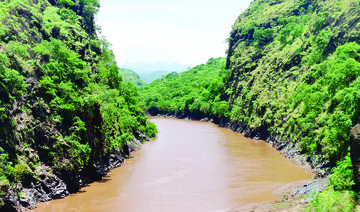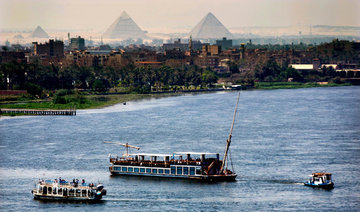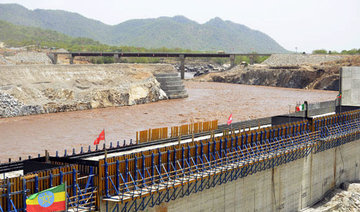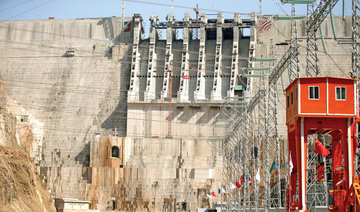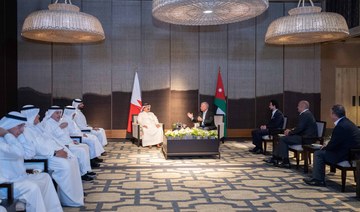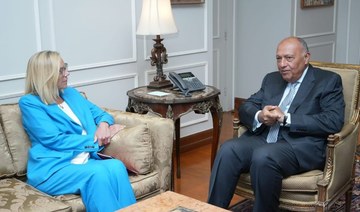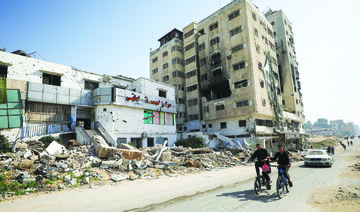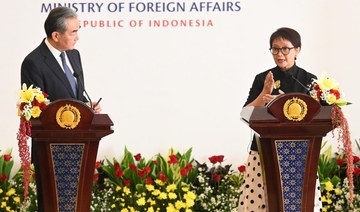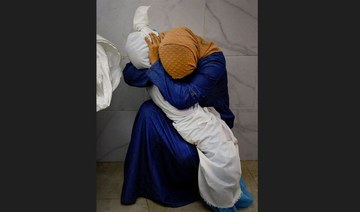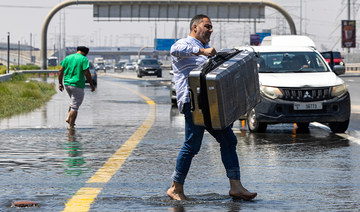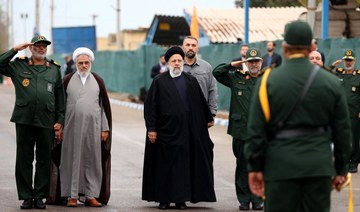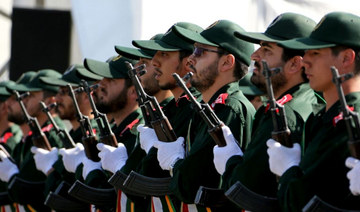CAIRO: There are fears that a unilateral attempt by Ethiopia to begin filling a huge new dam on the Nile will lead to the failure of technical discussions with Egypt and Sudan.
Disagreements between Ethiopia and Egypt on filling the reservoir and generating power within a few months on the Grand Ethiopian Renaissance Dam (GERD), which will be the largest in Africa, could not be resolved during the Tripartite National Technical Committee’s meeting, which brought together the Egyptian, Sudanese and Ethiopian ministers of water and was held in Addis Ababa on Oct. 19.
The day before the meeting, Ethiopia’s Communication and Information Technology Minister Debretsion Gebremichael announced that the construction of the dam had reached 62 percent and generating power would start this Ethiopian year and before construction is complete. The new Ethiopian year started on Sept. 11 and ends in October 2018.
“The remaining 38 percent of the construction will be done while the dam is generating hydroelectric power,” Gebremichael had told the Ethiopian News Agency.
Considering the slow pace at which the French consulting firms BRL and Artelia are preparing technical studies, it is speculated that before Ethiopia begins storing the Nile’s water in the dam, studies necessary for reaching a final agreement between Egypt, Ethiopia and Sudan on the rules of filling and operating the dam will be completed.
If no agreement takes place between the three countries, Ethiopia’s next step would be considered a clear violation of the tripartite Declaration of Principles on Ethiopia’s Renaissance Dam signed by Egyptian President Abdel Fattah El-Sisi, Sudanese President Omar Al-Bashir and Ethiopian Prime Minister Hailemariam Desalegn in Khartoum on March 23, 2015.
“Any unilateral attempt made by Ethiopia to initiate filling the dam would lead to the failure of the current technical discussions between the three countries,” said Dr. Ayman Shabana, professor of political science at the Institute of African Studies, Cairo University.
However, Hani Raslan, an expert on the Nile basin and Sudanese affairs at Al-Ahram Center for Strategic Studies, believes the declaration of principles does not provide a legally binding framework for Ethiopia since it obliges the three countries only to “respect” the terms and not “adhere” to them. “Respect can mean a different thing for each country,” he said.
“There are also controversial terms in the declaration of principles, especially the one that says filling the GERD reservoir is linked to completing joint technical studies,” he added, explaining that Ethiopia adopted “an elusive interpretation of this term.”
“Ethiopia has named two phases of the filling process: ‘The first filling,’ which it targets during the current stage in order to start generating power, and ‘the complete filling,’ which means filling the dam reservoir to its full capacity of 74 billion cubic meters,” he continued, “And it only associates the completion of technical studies and the filling and operation rules with the complete filling and not the first filling.”
Frozen negotiations
Egypt is increasingly concerned about Ethiopia’s intention to start storing water in the GERD reservoir before completing the technical studies and reaching a final agreement on filling and operation rules.
Egyptian Foreign Minister Sameh Shoukry discussed what he called the “frozen negotiations” of the tripartite technical committee. During a meeting with his Ethiopian counterpart, Workneh Gebeyehu, on the sidelines of the UN General Assembly on Sept. 21, Shoukry complained of the delay in issuing technical studies on the dam’s impact on Egypt and Sudan.
Egyptian President Abdel Fattah El-Sisi also pointed out the urgency of the speedy implementation of the declaration of principles on Ethiopia’s dam in his speech to the General Assembly on Sept. 19.
Shoukri explained that the reason behind the “slowdown” of issuing technical studies on the dam’s impact was the presence of obstacles that none of the three countries could overcome at technical or political levels. “These obstacles are a threat to the foundations of the Declaration of Principles agreement,” he said in an interview with Al-Ahram newspaper, published on Oct. 4.
He then added: “Not completing the technical studies prior to completing the dam’s construction and launching the filling process would make everyone suspect negotiations are being stalled to impede the report’s issuance.”
In spite of this, unofficial Egyptian sources acquainted with water management suggested that, to avoid the discussions failing, Egypt agree to the first filling of the GERD reservoir under three conditions:
First, the filling must be for trial purposes and not part of the actual filling process that leads to the dam’s official operation.
Second, the target water level of the first filling must be only enough for operating the two turbines installed by Ethiopia at the dam’s lower part, provided filling stops immediately after reaching this level and is resumed only after the completion of technical studies and reaching a final tripartite agreement on the rules of filling and operation. Egyptian sources estimated the amount of water needed for this purpose would be around 15 billion cubic meters.
Third, the first filling must be completed over two years, according to the same unofficial Egyptian sources, and not one year or less as planned by Ethiopia.
Dr. Shabana, of the Institute of African Studies at Cairo University, agrees with the above insight, stressing that “any step taken by Ethiopia toward initiating the filling process must be for trial purposes only and in full coordination with Egypt, as required by the declaration of principles.”
In Raslan’s opinion, Egypt currently lacks the tools for pressuring Ethiopia, which means it has to accept Ethiopia’s unilateral filling approach.
He also pointed out that the time at which the Ethiopian government announced its unilateral intention to start filling the GERD reservoir, which coincided with the tripartite technical committee’s meeting in Addis Ababa, confirms Ethiopia’s approach of refusing legal commitment as well as negotiations about its construction of GERD and development of its filling and operation rules. “Ethiopia refused to discuss the matter. Instead, it unilaterally announced it,” he said.
“In practice, Ethiopia does not respect the declaration of principles nor the technical discussions, but uses them as a façade to show goodwill and an alleged desire to cooperate with Egypt and Sudan and not harm them,” he continued. “Ethiopia’s ultimate and strategic goal is to completely and unilaterally control the Nile’s revenue, which is 48-50 billion cubic meters of water annually and accounts for most of Egypt’s annual allocation of the Nile’s water.”
Arab News sought a comment on this information from the Egyptian Ministry of Water Resources and Irrigation, but the ministry’s spokesperson declined to comment.
Technical committee
Technical matters associated with the best mechanism for filling and operating the Renaissance Dam without affecting the two downstream countries, Egypt and Sudan, are still being debated after the Tripartite National Technical Committee, composed of 12 experts from Sudan, Egypt and Ethiopia, held 16 rounds of negotiations, the latest of which was on Oct. 15 in Addis Ababa, to reach an agreement on the initial technical report submitted by the two French consulting firms, BRL and Artelia, in late March 2017.
On Sept. 20, 2016 in the Sudanese capital Khartoum, the three countries signed the contracts for the technical studies with the two French firms, marking the preparation for a technical file on the Renaissance Dam and its effect on downstream countries. The studies were supposed to be finalized by the two French firms last August according to the time frame of 11 months defined by the declaration of principles agreement, followed by the Khartoum Document, which was signed by the three countries’ foreign ministers in December 2015, in addition to a period of four months dedicated for the technical committee’s members to reach consensus on how to implement the studies’ outcomes.
“Ethiopia’s strategy is to either impose its views during the technical discussions or withdraw from all agreements and restart negotiations from scratch,” Raslan said. “Faced with this approach, Egypt had no decisive negotiation strategy and relied instead on successive concessions in hopes of mellowing Ethiopia, which never happened.”
Egypt’s Water Resources and Irrigation Minister Mohamed Abdel Ati predicted earlier that Ethiopia would start storing water in the GERD reservoir next year.
On Sept. 28, 2017, Misr News Agency quoted the minister saying: “The impact of the Renaissance Dam has not yet been experienced because the flow of water into Egypt is no different from that experienced during previous years, but it is very likely that part of the dam will be filled next year.”
He also stressed the importance of consensus on the method of filling and operating the dam.
In a press statement published on Oct. 18, 2017, the Ministry of Water Resources and Irrigation said that Egypt confirmed no water had been stored behind GERD this year and nothing was impeding the flow of water into the country until now.
The press statement was released a day after an Egyptian delegation, headed by Abdel Ati, on Oct. 17 visited the dam in Benishangul, which is 20 km from the Sudanese border, and “the visit was the first of its kind for an Egyptian government official.”
Complete filling
In addition to the dispute over Ethiopia’s intention to start the unilateral filling of the GERD reservoir as part of what it calls “the first filling,” what Ethiopia calls “the complete filling” poses a greater danger, said Hani Raslan, Nile basin and Sudanese affairs expert.
“Ethiopia insists on filling the reservoir within three years, which will deprive Egypt of around 25 billion cubic meters of water every year — almost half of its annual allocation of the Nile’s water,” Raslan explained. “Egypt, on the other hand, demanded filling the reservoir over a period of nine years.”
“If we take into account the annual loss of water caused by leakage and evaporation, the complete filling is expected to drain almost 90 billion cubic meters of water, not 74 billion cubic meters, which represents the final storage volume,” he added.
In the context of a strategic approach supported by several international and regional parties to reshape and strengthen Ethiopia’s influence and turn it into the greatest power in East Africa and the Nile basin, Addis Ababa has plans to export hydroelectric power.
Ethiopian attempt to begin filling Renaissance Dam may scupper deal with Egypt and Sudan, say experts
Ethiopian attempt to begin filling Renaissance Dam may scupper deal with Egypt and Sudan, say experts

King of Bahrain, Egyptian president highlight need for unified Arab response to Gaza crisis
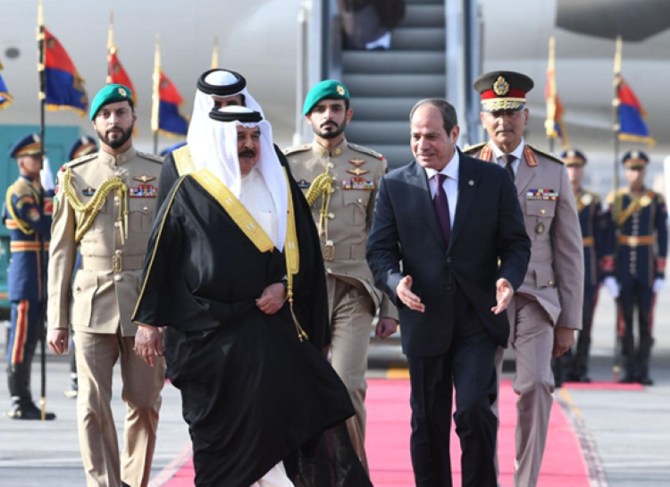
- Abdel Fattah El-Sisi and King Hamad pledge joint action to address the escalating crisis in Gaza
- King Hamad said that the president and he had also discussed the agenda for the 33rd Arab Summit, which Bahrain will host next month
CAIRO: Egyptian President Abdel Fattah El-Sisi and King Hamad of Bahrain have pledged joint action to address the escalating crisis in Gaza and its effects on the region.
El-Sisi received King Hamad in Cairo on Wednesday, where the leaders expressed hope that peace efforts would lead to a new path for the region, offering a future in which they work together toward prosperity.
King Hamad told a joint press conference that the president and he also discussed the agenda for the 33rd Arab Summit, which Bahrain will host next month.
The leaders emphasized the need for clear policies to promote peace, security and stability in the Middle East.
The king said he discussed several issues with El-Sisi to enhance Arab cooperation.
El-Sisi said he and King Hamad deliberated “on our countries’ efforts and joint Arab action to address this untenable situation, bring it to an end, and, above all, prevent its recurrence.”
The Egyptian leader added: “For this to happen, the international community shall stand united to enforce an immediate, urgent, and lasting ceasefire in the Gaza Strip, end any attempts of coerced displacement, starvation, or collective punishment of the brotherly Palestinian people, and ensure the full-fledged, unfettered and sustainable flow of sufficient quantities of desperately needed humanitarian aid and relief to the sector.
“In parallel, the parties shall immediately embark, in earnest, on tracks conducive to a just and enduring political solution to the Palestinian cause, based on the two-state solution and the establishment of an independent, sovereign Palestinian state, along the June 4, 1967 borders, with East Jerusalem as its capital, enjoying both international acknowledgment and full membership of the UN.”
El-Sisi said Egypt had repeatedly warned of the dire consequences likely to result from the ongoing war in occupied Palestine, where the conflict leads to calls for escalation and retribution, creating a cycle of violence that destroys any chance for peace and stability in the region.
“Indeed, over the past few months, the region has been experiencing the devastating consequences of the ongoing war as its flames spiraled outward, creating the current intensely fraught and perilous state in the region that gravely jeopardizes the security, stability, and future of our people,” he added.
El-Sisi said that the leaders “thoroughly discussed these troubling regional developments and our visions for addressing them, driven by our shared belief in the crucial importance of safeguarding the security and stability of the region and its peoples against multiple threats and of not abandoning their fate to the will of warmongers. This commitment is grounded in the principle of prioritizing common Arab security, which we consider as indivisible.”
El-Sisi said that the two leaders agreed on the need to exert and encourage immediate and intensive efforts toward de-escalation in the Palestinian territories and at regional level.
“We also discussed the importance of urging the parties to adopt a rational approach, embrace political solutions, and abandon military solutions and notions of dominance and hegemony,” the president said.
El-Sisi said: “Today, we are gathering at a time of great peril as a result of the bloody Israeli war on the Gaza Strip and the inexorable loss of thousands of helpless and innocent civilians in scenes of untold horror.
“They have done nothing more than live in their land, clinging to their homes and homeland, and yearning for a life with dignity, pride, and humanity.
“It is unequivocally a watershed moment that will endure in the annals of history, given the outrageous use of military force to terrorize, starve, and inflict unimaginable suffering on innocent civilians, collectively and indiscriminately, to terrify them into abandoning their homes and forcibly displace them from their land.
“All this unfolds while the international community stands by idly, with its ability or will to uphold justice and enforce international law, international humanitarian law, or even the basic tenets of humanity, utterly crippled,” El-Sisi said.
US, UK unveil sweeping sanctions on Iran’s drone program
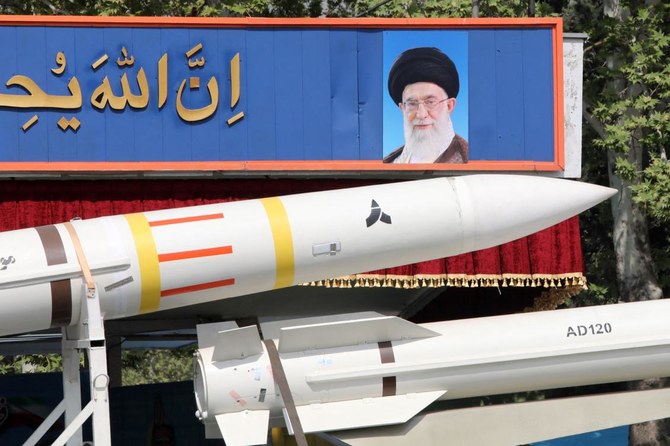
- Treasury’s Office of Foreign Assets Control targeted 16 people and two entities in Iran that produce engines that power the drones used in the April 13 attack on Israel
- UK is targeting several Iranian military organizations, individuals and entities involved in Iran’s drone and ballistic missile industries
WASHINGTON: The United States and the United Kingdom announced widespread sanctions against Iran’s military drone program on Thursday in response to its weekend attack against Israel.
Washington is targeting “16 individuals and two entities enabling Iran’s UAV production, including engine types that power Iran’s Shahed variant UAVs, which were used in the April 13 attack,” the Treasury Department said in a statement, referring to Iran’s unmanned aerial vehicle program.
The United Kingdom is also imposing sanctions “targeting several Iranian military organizations, individuals and entities involved in Iran’s UAV and ballistic missile industries,” the Treasury Department said.
Tehran launched its first ever direct military attack on Israel late Saturday in retaliation for an April 1 air strike on the Iranian consulate in Damascus — widely blamed on Israel — that killed seven members of the Islamic Revolutionary Guard Corps, including two generals.
The large-scale attack involved more than 300 drones and missiles, most of which were shot down by Israel and its allies including the US and the UK, causing little damage.
In response to the attacks, Israel’s prime minister, Benjamin Netanyahu, said Israel reserves the right to protect itself.
“Today, in coordination with the United Kingdom and in consultation with partners and allies, we are taking swift and decisive action to respond to Iran’s unprecedented attack on Israel,” US Treasury Secretary Janet Yellen said in a statement.
“We’re using Treasury’s economic tools to degrade and disrupt key aspects of Iran’s malign activity, including its UAV program and the revenue the regime generates to support its terrorism,” she continued.
“We will continue to deploy our sanctions authority to counter Iran with further actions in the days and weeks ahead,” she added.
Alongside its sanctions against Iran’s UAV program, the US is also sanctioning five companies providing parts for Iran’s steel industry.
“Iran’s metals sector generates the equivalent of several billion dollars in revenue annually, with the majority coming from steel exports,” the Treasury Department said, adding it had also sanctioned an automaker involved in providing “material support” to Iran’s Islamic Revolutionary Guard Corps.
Israel bombs Gaza as Middle East tense after Iranian attack
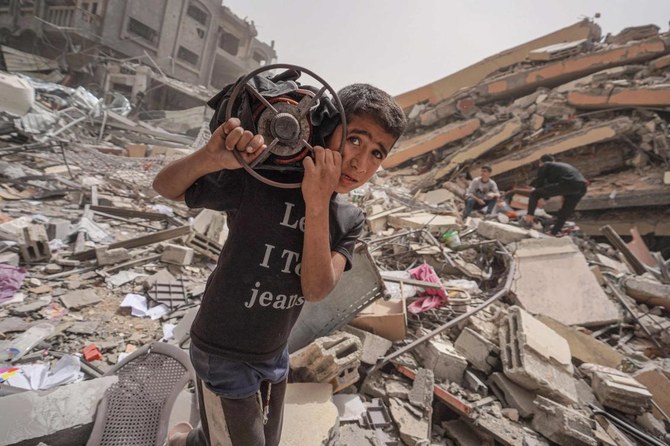
- “We are on the edge of a war in the Middle East which will be sending shock-waves to the rest of the world,” EU foreign policy chief Josep Borrell said
- Iran has warned of “a fierce and severe response” if Israel launches any further attacks after seven of its Revolutionary Guards died in the consular strike
JERUSALEM: Israel launched more deadly strikes on besieged Gaza on Thursday as world powers watched nervously whether the country would retaliate against a weekend attack by its arch enemy Iran.
The Israeli army said it had bombed dozens of targets in the Palestinian coastal territory of 2.4 million people, more than six months into the bloodiest ever Gaza war.
Weeks of talks toward an Israel-Hamas truce and hostage release deal have stalled, according to Qatar’s prime minister who said the Gulf emirate was now “reassessing our role as mediator.”
Israeli Prime Minister Benjamin Netanyahu, who has vowed to destroy Hamas over its October 7 attack on Israel, also stressed on Wednesday that Israel “reserves the right to protect itself” against Iran.
The Islamic republic last weekend carried out its first ever attack to directly target its regional foe but Israel, backed by its allies, intercepted most of the 300 missiles and drones and suffered no deaths.
Iran’s attack was retaliation for an April 1 air strike, which it blamed on Israel, on the consular annex of its embassy in Damascus.
The international community has urged de-escalation since Iran’s attack on Israel which came after months of high tensions and violence involving Israel and Iran-backed groups in Lebanon, Iraq, Syria and Yemen.
“We are on the edge of a war in the Middle East which will be sending shock-waves to the rest of the world,” EU foreign policy chief Josep Borrell said ahead of a G7 meeting in Capri, Italy.
Iran has warned of “a fierce and severe response” if Israel launches any further attacks after seven of its Revolutionary Guards died in the consular strike.
However, Tehran had also sought to calm tensions through indirect diplomatic channels with its other major adversary, the United States, which is Israel’s top ally and military supplier.
Foreign Minister Hossein Amir-Abdollahian, in New York for a UN meeting, said Iran had “tried to tell the United States clearly” that it is “not looking for the expansion of tension in the region.”
Washington has made clear it won’t join any Israeli attack on Iran, but has pledged to instead impose new punitive sanctions against Iran.
The European Union on Wednesday said it would impose new sanctions on Iran’s drone and missile producers.
Israeli public broadcaster Kan said Netanyahu, after discussions with US President Joe Biden, decided not to proceed with pre-arranged plans for retaliatory strikes on Iran.
“Diplomatic sensitivities came into play,” a senior Israeli official told Kan, speaking on condition of anonymity.
The official added that there would be a response, but that it would be different to the one initially planned.
US broadcaster ABC News, citing three unnamed Israeli sources, reported that Israel had “prepared for and then aborted retaliatory strikes against Iran on at least two nights this past week.”
Among the range of possible responses considered by Israel were an attack on Iranian proxies in the region or a cyberattack, the sources told ABC.
German airline Lufthansa extended its suspension of flights to and from Tehran and Beirut to the end of April and said its planes would continue avoiding Iranian airspace.
Israel’s Foreign Minister Israel Katz welcomed a European Union announcement of sanctions on Iran as “an important step” and wrote on X that “Iran must be stopped now before it is too late.”
Iran’s attack on Israel “is succeeding in taking the focus, particularly the media spotlight, off of the Gaza famine and the Gaza war and the loss of life that is taking place there,” Roxane Farmanfarmaian, a Middle East/North Africa specialist at the University of Cambridge’s POLIS department, told AFP.
“And that was very much I think what Israel planned to do,” she said.
An AFP correspondent in Gaza said Israeli artillery shelling and aircraft strikes again hit Gaza City overnight.
The Israeli military said it struck dozens of militant targets over the past day.
The war started after Hamas launched their unprecedented attack on October 7 that resulted in the deaths of 1,170 people in southern Israel, mostly civilians, according to an AFP tally based on Israeli official figures.
The militants also took about 250 hostages. Israel estimates 129 remain in Gaza, including 34 who are presumed dead.
Israel’s retaliatory offensive has killed at least 33,970 people in Gaza, mostly women and children, according to the latest toll on Thursday from the health ministry in the Hamas-run territory.
Gaza’s civil defense said Thursday it had recovered 11 more bodies in the southern city of Khan Yunis during the night.
Israel had also bombed the far-southern city of Rafah.
Gaza rescue crews recovered the corpses of eight family members, including five children and two women, from a house in Rafah’s Al-Salam neighborhood, the civil defense service said.
One woman in Rafah, Jamalat Ramidan, told AFP she and crying children fled the carnage of a strike, stumbling over “body parts and corpses scattered all over the place.”
Talks toward a ceasefire have stalled, said Qatari Prime Minister Sheikh Mohammed bin Abdulrahman Al-Thani, despite months of effort also involving United States and Egyptian officials.
He said his country was undertaking “a complete re-evaluation of its role because there has been damage to Qatar,” which does not have diplomatic relations with Israel.
Israel has faced growing global opposition to the Gaza war, which the United Nations and aid agencies say has left the north of the territory on the brink of famine.
Netanyahu on Wednesday rejected this, saying Israeli efforts were “above and beyond” what is needed “on the humanitarian issue,” his office said.
The UN Security Council was preparing to vote soon on an Algeria-drafted resolution for full United Nations membership for a Palestinian state, diplomatic sources said.
However, the veto-wielding United States has repeatedly expressed opposition to such a move.
Dubai Airport will return to full operational capacity within 24 hours, COO says
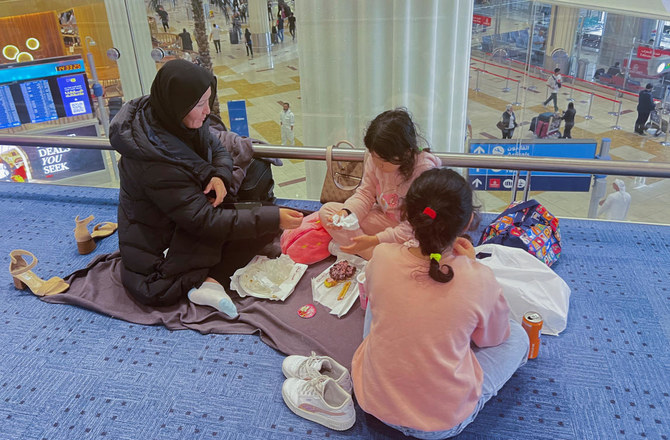
- The hub has struggled to clear a backlog of flights in the aftermath of heavy rain that swamped the United Arab Emirates on Tuesday
DUBAI: Dubai International Airport will return to its full operational capacity within 24 hours, Dubai Airports Chief Operating Officer Majed Al-Joker told state news agency WAM on Thursday.
The hub has struggled to clear a backlog of flights in the aftermath of heavy rain that swamped the United Arab Emirates on Tuesday.
“Once operations are back to normal, we will assess the damages and would be able to give figure for the size of losses,” Al Joker told Al Arabiya TV in a televised interview.
British MPs urge government to designate IRGC a terror group
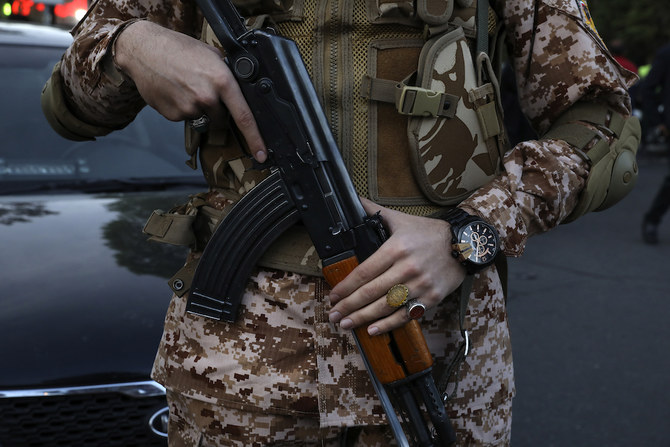
- Signatories to open letter say Iranian organization has ‘never posed a greater threat to UK’
- Proscription would put Islamic Revolutionary Guard Corps on par with Daesh, Al-Qaeda
LONDON: A cross-party group of more than 50 MPs and Lords peers in the UK have demanded that Iran’s Islamic Revolutionary Guard Corps be designated a terrorist organization.
The cross-party group, which includes former home secretaries Suella Braverman and Priti Patel, made the request in an open letter to The Times.
The IRGC is a key component of Iran’s military and power-projection capabilities. More than 125,000 personnel serve in its ranks, spread across wings including the Quds Force, the overseas element responsible for liaising with and supporting militias in Yemen, Lebanon, Iraq and Syria. In recent years, the IRGC has also built a relationship with Hamas in the Gaza Strip.
The open letter, signed by 134 people, follows last weekend’s Iranian attack on Israel, which signatories described as the “latest chapter of destructive terror by the IRGC.”
It says: “The government has combated extremism and terrorism by proscribing Hamas and Hezbollah but it is not enough.
“The IRGC is the primary source of ideological radicalisation, funding, equipment and training for these groups.
“The government must act against the root cause and proscribe the IRGC as a terrorist organisation.”
Iran’s attack was a response to Israel’s strike on its consulate in Damascus that killed 11 people, including senior commanders.
Former US President Donald Trump designated the IRGC as a terrorist organization in 2019, a year before the assassination of Qassem Soleimani, head of the Quds Force.
But the UK has been reluctant to follow the US measure for fear of breaking diplomatic communication channels with Tehran.
As part of sanctions on Iran targeting its nuclear program, however, the UK sanctioned the IRGC, freezing the assets of its members and implementing travel bans.
A terrorist designation in the UK would put the IRGC on par with Daesh and Al-Qaeda, and make it illegal to support the group, with a maximum penalty of 14 years’ imprisonment.
The 134 signatories said the IRGC has “never posed a greater threat to the UK,” accusing “thugs” belonging to the group of stabbing an Iranian dissident in London last month.
The letter was coordinated by the UK-Israel All Parliamentary Party Group, which includes former Immigration Minister Robert Jenrick.


